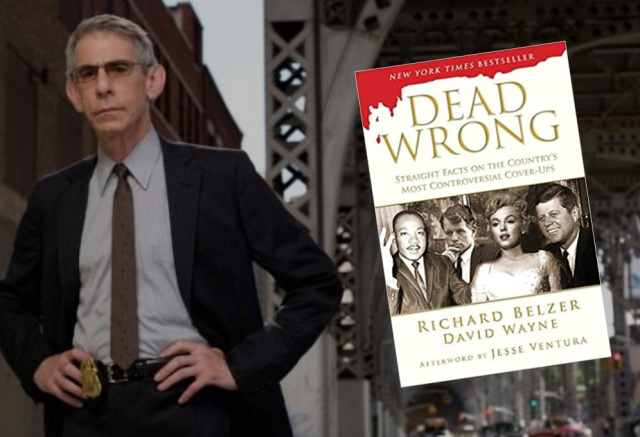
Note: Today is actor/author Richard Belzer’s birthday, and I thought I’d reprint this review I wrote of his 2012 book Dead Wrong: Straight Facts on the Country’s Most Controversial Cover-Ups. His latest book is Corporate Conspiracies: How Wall Street Took Over Washington.
There are those in positions of power who malign the pursuit of justice by intentionally associating the word “conspiracy” with the delirious hallucinations of unbalanced minds. They’re wrong. The real-world definition of conspiracy is simply; two or more persons agreeing to commit a crime. In short, they are everywhere, a constant component of daily events throughout our history, and are by no means the restless imaginings of an over-attentive audience.
–Richard Belzer, “Dead Wrong”
Richard Belzer, the co-author of the book Dead Wrong (2012, Skyhorse Publishing) is a synchromystic “nexus” in his own right; his conspiracy-theorist role John Munch appearing on more different TV shows than any other character. Outside of his main “beats” on Homicide and Law & Order SVU, Munch has “crossed over” in The X-Files, Arrested Development, The Wire, Luther, and a number of others. These “crossovers” are significant in that they not only have transcended the barriers of individual television programs, but even whole networks.
And the book Dead Wrong indeed reads far more like a police procedural than a standard “conspiracy” text. Reviewing the deaths of such public figures as Martin Luther King Jr., Marilyn Monroe, and JFK, Dead Wrong places a strong emphasis on forensic evidence; while there is some speculation on motives and grander assassination plots, the focus always returns to “just the facts, ma’am.”
But perhaps even more “meta” than that is the fact that in real life, Belzer is a real, for lack of a better term, “conspiracy theorist.” Or perhaps he is just a man who has a great deal of curiosity; an investigator into cases that are considered “closed” by our mainstream media. In that sense, he is truly not that different from Detective Munch.
Belzer and co-writer David Wayne’s approach here, therefore, continually maintains this subliminal connection to Munch and the Homicide/Law & Order shows. And it becomes increasingly clear that these murder/”suicides,” when seen through the cold, clinical eyes of the detective, have a whole lot more going on about them than the “official story.” In the cases of figures like Monroe—the forensic evidence of her death pretty much ruling out suicide—this is quite disturbing.
Unless the forensics and other evidence that Belzer and Wayne so meticulously present here are falsified, Dead Wrong is a bombshell text in not only the genre, but in history books in general.
I do not exaggerate when I use the term “meticulously.” If there is a flaw in this book, it’s that the same evidence will be repeated over and over in the course of a chapter; though I have to wonder if this is less a problem with the editing and more of a conscious tactic to literally hammer home into our heads the importance of the forensics here.
While there’s not a lot of actual conspiracy “theory” here, Belzer and Wayne come up with some very interesting ways of looking at famous cases that I never considered before. For example, the assassination of JFK. It is suggested in Dead Wrong that the reason the government engaged in such a massive cover-up was not so much because they were involved in the assassination (though a few rogue elements within might have been)—but that discovering the truth about the assassination would in turn compromise other CIA operations:
The cover-up was apparently necessitated by the exposure and implication of covert U.S. intelligence anti-Castro operations which were utilizing the Mafia to attempt to assassinate Fidel Castro. It is an often overlooked fact that in the immediate aftermath of the assassination, Robert F. Kennedy was the most powerful person in the United States—more so than even new President Lyndon B. Johnson. In the hours after the murder, it was Robert Kennedy and Kennedy loyalists who controlled the autopsy, the doctors, the body of President Kennedy, and the actions of much of the Secret Service, law enforcement, and emergency personnel…Obviously, Robert Kennedy was not involved in the death plot against his brother. But just as obviously, his hand was forced into covering up the true circumstances surrounding the murder.
So we have the idea here that the parties who engage in cover-ups might not be the same ones who have committed the initial crimes. Same thing for Monroe—she wasn’t murdered by the Kennedys, but the Kennedys had to conduct a full cover-up in order to keep other secrets safe.
Dead Wrong ends with an afterward by Jesse Ventura. He reiterates a crucial point Belzer mentions in the introduction and which is exemplified in the methodology of the book itself: the idea that the word “conspiracy” has been automatically conflated with “crazy” in our mass-media, and why this is an erroneous assumption to make.
Writes Ventura:
Another disturbing trend in recent events is what I see as the very intentional manipulation of the word “conspiracy.” They would have us believe that any person who believes that something might possibly be a conspiracy has to be a demented individual. They make it sound like one would have to be crazy to even suspect that members of our government could take part in a conspiracy. I suggest that the truth of the matter is quite the contrary. As this book has clearly established, conspiracies are not some rare occurrence in history. They are common. They can and do happen all the time.
Unless reading a lot of procedural/science stuff deeply bores you, I would strongly recommend adding Dead Wrong to your library. As much as I like the more esoteric/”outre” books on these topics, texts like this have the greatest ability to change minds…or at least render minds more open to new ideas and possibilities.
More to read about on Butterfly Language:
The One Where Richard Belzer Got Knocked Unconscious By Hulk Hogan
Born On This Day: Andy Kaufman, Who Did It For The Lulz
Put On These Glasses: A Tribute To Rowdy Roddy Piper and “They Live”





